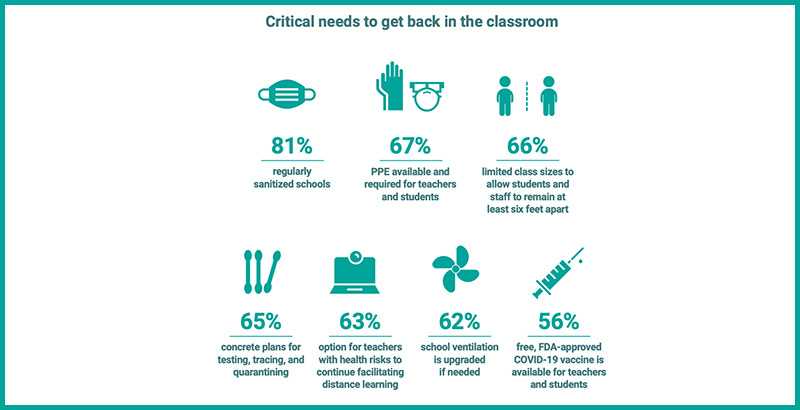Analysis: New Survey Shows Teachers Think Cleaning & Ventilation, Smaller Classes and PPE Are More Important than Vaccines for Reopening. But Unions & Districts Aren’t Listening

The most surprising thing about the chaos surrounding school reopening decisions across the country is how little actual teachers have been part of the process.
In Chicago, where a months-long battle between the teachers union and mayor has brought educators to the verge of a strike, one local middle school teacher wrote in a recent column, “The last time my union or my district asked me about what I needed or how I was feeling was the beginning of the school year — nearly five months ago.”
She’s not alone. A new national educators survey by my organization, Educators 4 Excellence, found just 37 percent of teachers had heard from their union and just 21 percent from their district leaders about what they needed to return to the classroom.
Politicians and unions are negotiating reopening plans without meaningful input from the people who have to implement them or are the most impacted. Any deals these decisionmakers negotiate stand to be pyrrhic victories if they don’t give teachers confidence about going back to their physical classrooms.
Take the vaccine debate. Vaccination is key to reopening, and we’ve joined many others in advocating that teachers be in the first phase of essential workers to receive the shots. But inoculation is not the only or even the top priority for teachers to feel comfortable returning to their classrooms. While 56 percent of the 800 full-time public school teachers in our nationally representative sample said an effective vaccine is critically important, they felt more strongly about regular cleanings, limited class sizes and the availability of personal protective equipment as crucial measures for keeping buildings safe.
The demands on teachers are also enormous. Like so many other workers, 81 percent of teachers say they are balancing work, family and personal responsibilities. They are mothers, fathers and caregivers as well as educators. So reopening plans need to include flexibility for those with a demonstrated need.
Perhaps the biggest challenge awaiting educators is helping students who have fallen behind over the last year to catch up. Nearly two-thirds of teachers said student learning is worse than before the pandemic, and more than 80 percent said there are concerns about students’ social-emotional well-being. As policymakers debate what school should look like postpandemic, educators must be part of the solution.
According to the survey, teachers support expanding the school day and year. They’re willing to work longer hours and take on extra responsibilities in their buildings. The unknown is whether and how they will be compensated.
State budgets are facing historic shortfalls. This is why federal funds are needed to not only protect teachers’ jobs, but also to enable states and districts to make the necessary investments to increase learning time and support students’ recovery.
At an average salary of $61,000 per year, teachers remain among the lowest-paid professionals in the U.S. They deserve higher pay and are willing to make tradeoffs to increase their compensation. In our survey, 60 percent said they would trade tenure protections for higher salaries and 51 percent for better benefits, if given the option.
The good news is that despite all they have had to contend with over the past year, teachers still love their jobs. Eighty-five percent of those surveyed said they are likely to spend their career in the classroom, with few reporting that the pandemic has led them to rethink their choices.
Sure, our schools have a million problems right now, but they also have 3 million solutions — our teachers. Let’s make sure we give them the opportunity to lead us, and our children, to a better future.
Evan Stone is co-chief executive officer and a co-founder of Educators for Excellence (E4E).
Get stories like these delivered straight to your inbox. Sign up for The 74 Newsletter

;)
